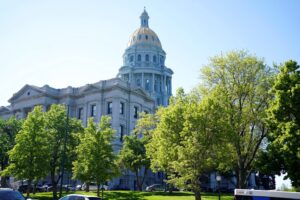TABOR: The enduring success story empowering Colorado taxpayers
BY BARRY W. POULSON, OPINION CONTRIBUTOR – 03/22/24 7:00 AM ET
 AP Photo/David Zalubowski
AP Photo/David Zalubowski
The dome of the State Capitol shines in the early morning sun Friday, May 28, 2021, in downtown Denver. (AP Photo/David Zalubowski)
Even as economists tout a soft landing for the U.S. economy, Americans are facing sticker shock at the grocery store, the gas pump, and fast-food restaurants, among other places.
After a long bout of double-digit inflation, not unlike that of the 1970s. We have learned once again that unconstrained growth in federal spending funded by borrowing and accommodative monetary policy eventually triggers high inflation.
In response to stagflation in the 1970s, Congress enacted statutory fiscal rules designed to balance the budget and stabilize debt. The Federal Reserve also pursued tighter monetary polies to stabilize prices. In the 1990s, a period referred to as “The Great Moderation,” the federal government achieved sustainable debt levels and low rates of inflation.
Unfortunately, over the last two decades, the federal government largely abandoned these fiscal and monetary policies. Federal spending has far outpaced the growth in national income, and federal debt has grown at an unsustainable rate. The statutory fiscal rules designed to constrain federal spending are routinely circumvented and suspended.
The Federal Reserve has again used monetary policy to accommodate these fiscal policies, resulting in wide swings in the rate of inflation. It is difficult to argue that we are experiencing a soft landing and that all is well. A more realistic forecast is that over the next decade we will again experience stagflation.
But there is a bright spot in this gloomy outlook.
In response to stagflation in the 1970s, citizens launched state and local tax revolts. Beginning with property tax limitations in California, citizens began to challenge profligate fiscal policies at the state and local level. Using the initiative and referendum, citizens enacted tax and expenditure limits to constrain fiscal policies. Continue reading →

 AP Photo/David Zalubowski
AP Photo/David Zalubowski